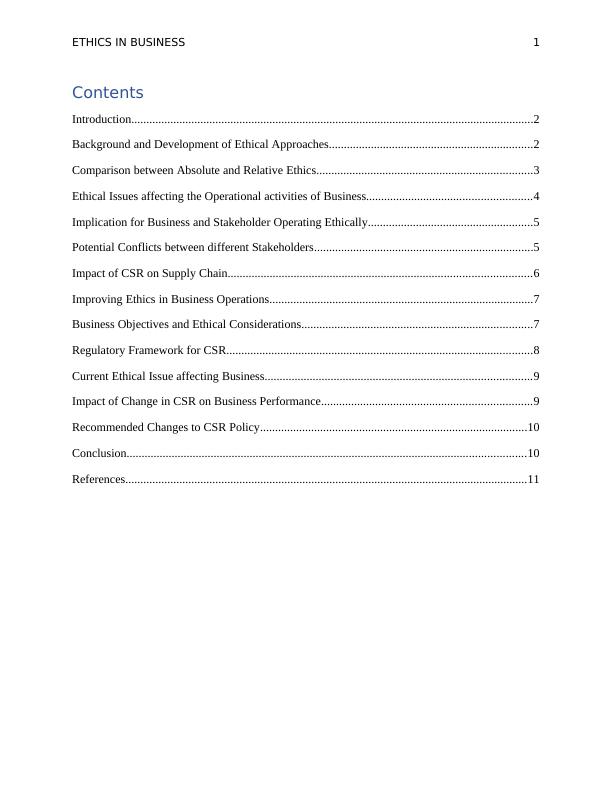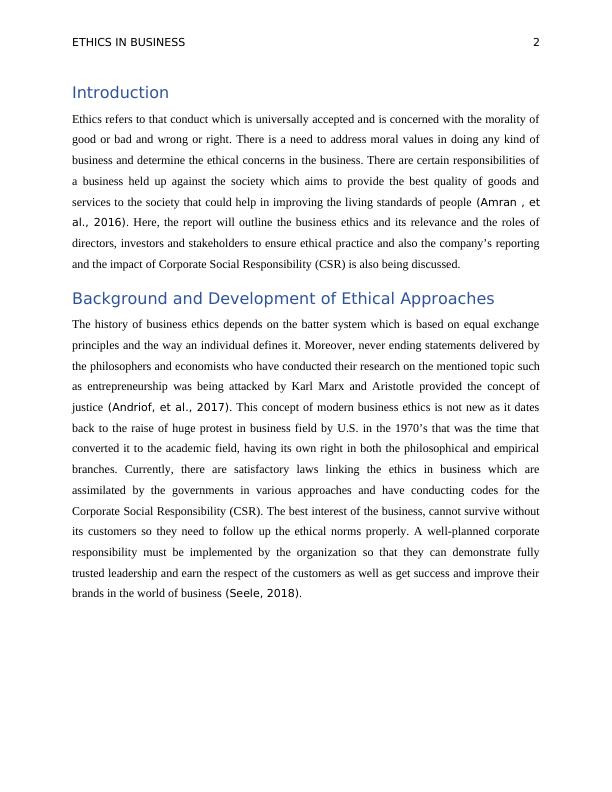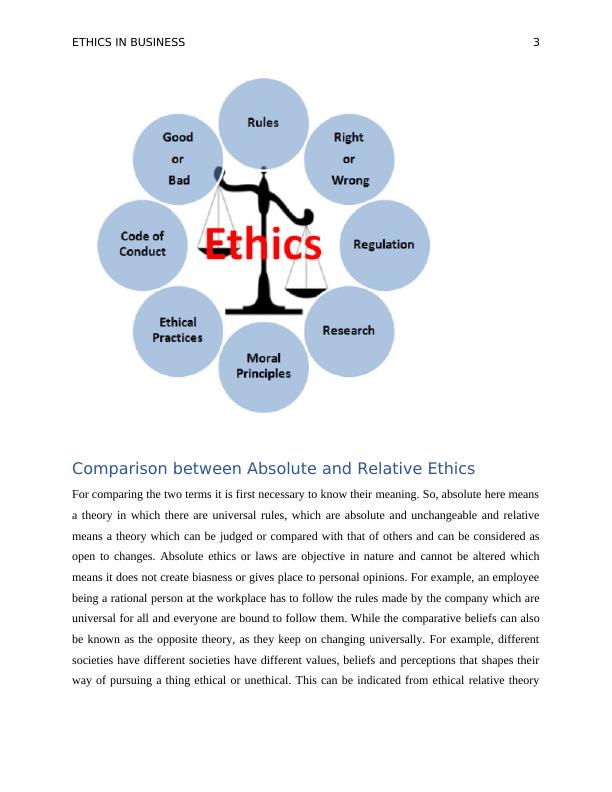ETHICS IN BUSINESS.
Added on 2022-11-17
15 Pages4507 Words1 Views
RUNNING HEAD: ETHICS IN BUSINESS 0
ETHICS IN BUSINESS
Student’s Details-
ETHICS IN BUSINESS
Student’s Details-

ETHICS IN BUSINESS 1
Contents
Introduction......................................................................................................................................2
Background and Development of Ethical Approaches....................................................................2
Comparison between Absolute and Relative Ethics........................................................................3
Ethical Issues affecting the Operational activities of Business.......................................................4
Implication for Business and Stakeholder Operating Ethically.......................................................5
Potential Conflicts between different Stakeholders.........................................................................5
Impact of CSR on Supply Chain.....................................................................................................6
Improving Ethics in Business Operations........................................................................................7
Business Objectives and Ethical Considerations.............................................................................7
Regulatory Framework for CSR......................................................................................................8
Current Ethical Issue affecting Business.........................................................................................9
Impact of Change in CSR on Business Performance......................................................................9
Recommended Changes to CSR Policy.........................................................................................10
Conclusion.....................................................................................................................................10
References......................................................................................................................................11
Contents
Introduction......................................................................................................................................2
Background and Development of Ethical Approaches....................................................................2
Comparison between Absolute and Relative Ethics........................................................................3
Ethical Issues affecting the Operational activities of Business.......................................................4
Implication for Business and Stakeholder Operating Ethically.......................................................5
Potential Conflicts between different Stakeholders.........................................................................5
Impact of CSR on Supply Chain.....................................................................................................6
Improving Ethics in Business Operations........................................................................................7
Business Objectives and Ethical Considerations.............................................................................7
Regulatory Framework for CSR......................................................................................................8
Current Ethical Issue affecting Business.........................................................................................9
Impact of Change in CSR on Business Performance......................................................................9
Recommended Changes to CSR Policy.........................................................................................10
Conclusion.....................................................................................................................................10
References......................................................................................................................................11

ETHICS IN BUSINESS 2
Introduction
Ethics refers to that conduct which is universally accepted and is concerned with the morality of
good or bad and wrong or right. There is a need to address moral values in doing any kind of
business and determine the ethical concerns in the business. There are certain responsibilities of
a business held up against the society which aims to provide the best quality of goods and
services to the society that could help in improving the living standards of people (Amran , et
al., 2016). Here, the report will outline the business ethics and its relevance and the roles of
directors, investors and stakeholders to ensure ethical practice and also the company’s reporting
and the impact of Corporate Social Responsibility (CSR) is also being discussed.
Background and Development of Ethical Approaches
The history of business ethics depends on the batter system which is based on equal exchange
principles and the way an individual defines it. Moreover, never ending statements delivered by
the philosophers and economists who have conducted their research on the mentioned topic such
as entrepreneurship was being attacked by Karl Marx and Aristotle provided the concept of
justice (Andriof, et al., 2017). This concept of modern business ethics is not new as it dates
back to the raise of huge protest in business field by U.S. in the 1970’s that was the time that
converted it to the academic field, having its own right in both the philosophical and empirical
branches. Currently, there are satisfactory laws linking the ethics in business which are
assimilated by the governments in various approaches and have conducting codes for the
Corporate Social Responsibility (CSR). The best interest of the business, cannot survive without
its customers so they need to follow up the ethical norms properly. A well-planned corporate
responsibility must be implemented by the organization so that they can demonstrate fully
trusted leadership and earn the respect of the customers as well as get success and improve their
brands in the world of business (Seele, 2018).
Introduction
Ethics refers to that conduct which is universally accepted and is concerned with the morality of
good or bad and wrong or right. There is a need to address moral values in doing any kind of
business and determine the ethical concerns in the business. There are certain responsibilities of
a business held up against the society which aims to provide the best quality of goods and
services to the society that could help in improving the living standards of people (Amran , et
al., 2016). Here, the report will outline the business ethics and its relevance and the roles of
directors, investors and stakeholders to ensure ethical practice and also the company’s reporting
and the impact of Corporate Social Responsibility (CSR) is also being discussed.
Background and Development of Ethical Approaches
The history of business ethics depends on the batter system which is based on equal exchange
principles and the way an individual defines it. Moreover, never ending statements delivered by
the philosophers and economists who have conducted their research on the mentioned topic such
as entrepreneurship was being attacked by Karl Marx and Aristotle provided the concept of
justice (Andriof, et al., 2017). This concept of modern business ethics is not new as it dates
back to the raise of huge protest in business field by U.S. in the 1970’s that was the time that
converted it to the academic field, having its own right in both the philosophical and empirical
branches. Currently, there are satisfactory laws linking the ethics in business which are
assimilated by the governments in various approaches and have conducting codes for the
Corporate Social Responsibility (CSR). The best interest of the business, cannot survive without
its customers so they need to follow up the ethical norms properly. A well-planned corporate
responsibility must be implemented by the organization so that they can demonstrate fully
trusted leadership and earn the respect of the customers as well as get success and improve their
brands in the world of business (Seele, 2018).

ETHICS IN BUSINESS 3
Comparison between Absolute and Relative Ethics
For comparing the two terms it is first necessary to know their meaning. So, absolute here means
a theory in which there are universal rules, which are absolute and unchangeable and relative
means a theory which can be judged or compared with that of others and can be considered as
open to changes. Absolute ethics or laws are objective in nature and cannot be altered which
means it does not create biasness or gives place to personal opinions. For example, an employee
being a rational person at the workplace has to follow the rules made by the company which are
universal for all and everyone are bound to follow them. While the comparative beliefs can also
be known as the opposite theory, as they keep on changing universally. For example, different
societies have different societies have different values, beliefs and perceptions that shapes their
way of pursuing a thing ethical or unethical. This can be indicated from ethical relative theory
Comparison between Absolute and Relative Ethics
For comparing the two terms it is first necessary to know their meaning. So, absolute here means
a theory in which there are universal rules, which are absolute and unchangeable and relative
means a theory which can be judged or compared with that of others and can be considered as
open to changes. Absolute ethics or laws are objective in nature and cannot be altered which
means it does not create biasness or gives place to personal opinions. For example, an employee
being a rational person at the workplace has to follow the rules made by the company which are
universal for all and everyone are bound to follow them. While the comparative beliefs can also
be known as the opposite theory, as they keep on changing universally. For example, different
societies have different societies have different values, beliefs and perceptions that shapes their
way of pursuing a thing ethical or unethical. This can be indicated from ethical relative theory

End of preview
Want to access all the pages? Upload your documents or become a member.
Related Documents
Business Ethics | Presentation-1lg...
|14
|826
|40
Business Ethics Assignment Reportlg...
|15
|3647
|38
Ethical Perspectives in Business Ethicslg...
|13
|5048
|391
Business Ethics Assignment of Volkswagenlg...
|15
|4512
|140
Ethical Theories Assignmentlg...
|8
|3393
|221
Business Ethics of Volkswagen - Reportlg...
|14
|4315
|32
